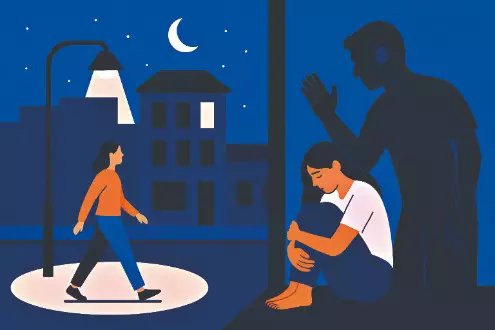Safe streets, unsafe homes
Even as we live through an uncertain world, more people are feeling safer in their communities. However, even in this, the gender gap between men and women continues to yawn

15 years ago, as a young, underpaid and overworked beat reporter, I probably looked harrowed almost all the time. A seriously ailing father made a grim existence seem even more serious. During that time when life seemed anything but in technicolour, a senior colleague once remarked — “Life is lived between vacations”. Not only did those words stay with me, but as soon as I was financially able, I started acting upon this aspiration. Every year, I would plan an annual break, and within a few months of completing it, I’d set about preparing for the next one. The excitement, the build-up, that ‘something to look forward to’ kept me motivated the whole year. Holidays, no matter how grand or humble, have always kept me going. Those breaks have added meaning to my daily rigmarole, the endless duties, and life’s many unwanted responsibilities. Travelling to new places, soaking in different cultures, food, music, and history is the gift I give myself while virtually patting my back, and silently telling myself, “you deserve this”. With professional growth and ease of global travel, local trips became foreign ones. And like clockwork, with the onset of Indian monsoons every year, my heart would yearn, and plans for the next annual break would be afoot. Not this year, though.
The world feels decidedly less safe than usual. Global wars, restricted air space, anti-government protests, pro-Palestine rallies — anger and discontent are spilling onto the streets of the United Kingdom, Spain, Italy, France, Germany, and many more. Governments in Japan, France, and Nepal collapsed like dominoes in three days. The Global Protest Tracker at the Carnegie Endowment for International Peace states that in the last 12 months, there have been over 142 noteworthy anti-government protests around the world across 68 nations. As of September 1, there are 30 active protests. In this context, the recently released ‘2025 Global Safety Report’ by American analytics and advisory company, Gallup, and the Center on International Cooperation (New York University) threw up some intriguing deductions.
The report extrapolates a paradox unfolding in the world — that even though we are witnessing the most number of armed conflicts than ever since World War II, more people feel safer within their communities. The United Nations’ Sustainable Development Goal 16’s standard of how safe people feel walking alone at night becomes a strong universal indicator of peace, growth, inclusiveness, and prosperity. The report notes that in 2024, 73 per cent of adults around the world felt safe walking alone at night where they live — the highest recorded level since the monitoring began in 2006. By that logic, the report highlights the contradiction that even though much of the world is engulfed in some form or intensity of conflict, even in uncertain times like these, people are feeling safer relying on trust built through neighbours, institutions, and habits. I think this also begs the question — perhaps people are feeling so unsure of the outside world that they’re only really sure of their own familiar surroundings? A kind of reverse psychology, almost, wherein there is such insurmountable violence, fear, or sorrow all around, that by comparison, a general feeling of individual safety feels more reassuring than being subjected to a planned genocide or being suddenly smote by a bomb.
The report also threw up some other interesting conclusions. Singapore ruled global safety charts for the 12th time, with 98 per cent surveyed people feeling safe walking alone at night, followed by Tajikistan (95 per cent), and China (94 per cent). The Gulf countries have registered strong safety perceptions, with Saudi Arabia, Oman, Kuwait, Bahrain, and the United Arab Emirates recording ratings of over 90 per cent. These statistics give credence to several testimonials that swear by the sense of personal security in the region. The report found African nations of South Africa (33 per cent), Lesotho (34 per cent), and Botswana (34 per cent) to be the least safe. Closer home, 72 per cent of Indians felt safe walking alone at night.
Women, however, don’t necessarily join this upbeat feeling of safety. While the report states the glaring gender gap between men feeling safer than women, it fails to delve deeper. Across the 144 surveyed countries, 67 per cent of women felt unsafe walking alone at night as compared to 78 per cent of men. In over 100 nations, the gender gap was greater than 10 percentage points. Curiously, many high-income countries such as the US, Australia and several European Union countries (Italy, Netherlands, Greece, Malta, Cyprus) posted some of the highest gender discrepancies with gaps of 26 points or more. One in three women still felt unsafe within communities, gender-based violence put many women at risk, and more women were vulnerable at home. This index further proves that violence reduction policies have not positively impacted women, which becomes yet another attestation that equality is not within our reach just yet.
Views expressed are personal. The writer is an author and media entrepreneur



